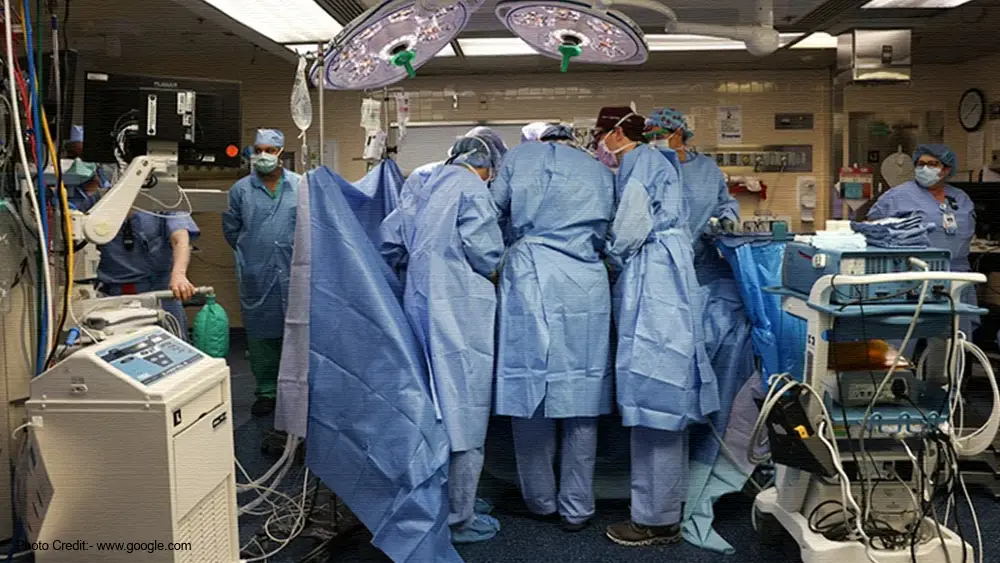
HEALTH NEWS
Pig Kidney Transplant: Paving the Way for Organ Transplantation
-
Rahul Priydarss
Pig kidney transplantation offers a promising solution to the shortage of human organs for transplantation. Despite challenges like immune rejection and ethical concerns, advancements in genetic engineering provide hope for improved patient outcomes. With ongoing research, pig kidney transplants have the potential to reshape the landscape of organ donation, addressing critical issues in transplantation.
Understanding Pig kidney Transplant:
Organ transplantation has revolutionised modern medicine, offering hope to countless individuals suffering from end-stage organ failure. However, the scarcity of human organs for transplantation remains a critical challenge, leading researchers to explore alternative solutions. One such innovative approach is pig kidney transplantation, a groundbreaking field of study with the potential to reshape the landscape of organ donation and transplantation.

Table of Contents
What is Xenotransplantation:
Xenotransplantation is a medical procedure that involves transplanting organs or tissues from an animal into a human recipient. It’s essentially using animal parts to save human lives.
Xenotransplantation is a medical procedure where organs, tissues, or cells from one species are transplanted into another species, typically from animals to humans. The prefix “xeno-” means “foreign” or “different,” indicating that the transplant involves transferring biological material between different species.
There’s a big shortage of human organs available for transplants, and Xenotransplantation is seen as a potential solution. Pigs are the most commonly considered animal source for these transplants because their organs are similar in size to human organs, and there’s a readily available supply of pigs.
However, there are challenges to Xenotransplantation. One major hurdle is the body’s immune system rejecting the animal organ. Researchers are working on ways to genetically modify animals to reduce this risk.
History of Xenotransplantation:
The idea of xenotransplantation, though sounding futuristic, has a surprisingly long history with its roots dating back to the 17th century. Here’s a glimpse into some key milestones.
Early Attempts (17th-20th century): The concept goes back as far as 1667, with attempts at blood transfusions from animals like sheep and calves [1]. Skin grafts using frogs were also attempted in the 19th century. An interesting, but ultimately disproven, theory involved transplanting chimpanzee testes into men to regain youthfulness in the 1920s.
First Clinical Trials (1960s): With the development of immunosuppressant drugs to manage organ rejection, xenotransplantation saw renewed interest. The 1960s witnessed the first clinical trials using chimpanzee kidneys and hearts in critically ill patients. The survival rates were low, but these attempts paved the way for further research.
Shifting Focus and Genetically Modified Animals (1990s-Present): As organ donation programs improved, the focus shifted away from primates due to ethical concerns. Pigs emerged as a promising alternative due to their organ size and availability. The introduction of genetic engineering offered hope for reducing organ rejection by modifying pig organs to be more compatible with the human body.
Advantages of Pig Kidney Transplants:
Pig kidney transplants, a form of xenotransplantation, offer several potential advantages over traditional human-to-human kidney transplants.
Increased Organ Availability: The most significant advantage is addressing the critical shortage of human donor kidneys. There are simply not enough deceased human donors to meet the ever-growing demand for kidney transplants. Pig kidneys, if successfully transplanted, could significantly reduce waiting times and save many lives.
Faster Wait Times: Patients with severe kidney failure currently endure long wait times, often on dialysis which can be a physically draining experience. Pig kidneys could potentially be available on-demand, eliminating the wait and improving patient outcomes.
Universal Compatibility: Ideally, genetically modified pig kidneys could become universally compatible, reducing the need for complicated matching processes based on blood type and tissue characteristics, which are crucial in human-to-human transplants.
Quality: Some studies suggest that pig kidneys, due to their rapid growth cycle, might even be healthier than kidneys from deceased human donors. This could lead to better long-term outcomes for transplant recipients.
Challenges and Risks Associated with Pig Kidney Transplants:
Despite the promise of pig kidney transplants, there are significant challenges and risks to consider.
Immune Rejection: The human body’s immune system is designed to recognize and attack foreign objects. Even with genetic modifications to pig organs to make them more compatible, there’s a high risk of the recipient’s body rejecting the pig kidney. Developing effective immunosuppressive drugs to manage this rejection is crucial.
Transmission of Pig Viruses: Pigs harbor viruses that can potentially infect humans, some of which might be unknown or undetectable. Extensive testing and careful monitoring are needed to ensure the safety of recipients from potential zoonotic diseases.
Ethical Concerns: Xenotransplantation raises ethical questions. Some argue that using animals as organ sources is morally wrong. Additionally, the long-term effects on the recipient and potential consequences of introducing animal organs into the human body require careful consideration.
Technical Complexities: Genetically modifying pigs to create compatible organs and perfecting surgical techniques for transplanting animal organs into humans are complex processes that require further research and refinement.
Long-Term Effects: The long-term effects of pig kidney transplants on the recipient’s body are unknown. There could be unforeseen complications or issues with organ function over time that require further investigation.
Infectious Diseases: Another concern is the potential transmission of infectious diseases from donor pigs to human recipients. Pigs can carry viruses and pathogens that may pose risks to human health, necessitating rigorous screening and monitoring protocols to minimize the risk of disease transmission post-transplantation.
Breakthroughs in Xenotransplantation Research:
Xenotransplantation research has made some exciting strides in recent years, particularly regarding pig-to-human transplants. Here are some key breakthroughs.
Genetically Modified Pigs: Scientists have successfully modified pig genes to address a major challenge – hyperacute rejection. This rejection occurs because of a sugar molecule on pig cells that the human immune system attacks. Researchers have created pig organs more compatible with the human body by removing this sugar molecule through genetic modification.
Successful Pre-Clinical Trials: In 2022, a groundbreaking pre-clinical study at the University of Alabama at Birmingham (UAB) transplanted pig kidneys into brain-dead human recipients. These kidneys remarkably showed signs of life-sustaining function, filtering waste products from the blood similar to human kidneys.
Progress in Immunosuppression: Developing effective immunosuppressive regimens to prevent rejection is critical for xenotransplantation success. Research is ongoing to create targeted immunosuppressive drugs that suppress the immune response specifically towards the pig organ while minimizing side effects for the recipient.
CRISPR Technology: The revolutionary gene-editing tool CRISPR holds immense promise for xenotransplantation. It allows for more precise and efficient genetic modifications in pigs, potentially creating organs with even greater human compatibility and reducing the risk of rejection.

World 1st Pig Kidney Transplant Patient Discharged from US Hospital:
In a landmark achievement in the field of medicine, a 62-year-old man has been discharged from Massachusetts General Hospital (MGH) following a groundbreaking kidney transplant procedure. According to a report by BBC, this historic event marks the first successful kidney transplant from a genetically modified pig, signifying a significant breakthrough in organ transplantation.
A Historic Breakthrough: The news of this groundbreaking achievement was announced through a press release issued by MGH, a renowned teaching hospital affiliated with Harvard Medical School, located in Boston, United States. The patient, identified as Richard “Rick” Slayman from Weymouth, Massachusetts, had been grappling with end-stage kidney disease, necessitating urgent intervention in the form of an organ transplant.
The Procedure: On March 16, Mr. Slayman underwent a transformative surgery that lasted for approximately four hours, during which doctors transplanted a genetically edited pig kidney into his body. Following the procedure, medical professionals reported that Mr. Slayman’s new kidney is functioning optimally, obviating the need for dialysis, a significant improvement in his quality of life.
Hope Restored: Expressing his gratitude and joy, Mr. Slayman shared that being discharged from the hospital was one of the happiest moments of his life. He expressed his anticipation of reuniting with his family and friends, free from the constraints imposed by dialysis that had affected him for years.
A Beacon of Hope: Mr. Slayman’s journey to receiving a pig kidney transplant began after a previous kidney transplant from a deceased human donor in 2018 showed signs of deterioration last year. Faced with this setback, doctors suggested the possibility of a pig kidney transplant, a decision Mr. Slayman saw not only as a lifeline for himself but also as a source of hope for the countless individuals in need of organ transplants to survive.
Genetic Modifications: The pig kidney Mr. Slayman received underwent genetic modifications by eGenesis, a Cambridge-based pharmaceutical company. The modifications involved removing harmful pig genes and incorporating specific human genes to enhance compatibility with human recipients, thereby reducing the risk of rejection.
A Legacy of Innovation: MGH underscored its legacy as a pioneer in the field of organ transplantation, dating back to 1954 when it performed the world’s first successful human organ transplant, a kidney. Additionally, the hospital highlighted its collaborative efforts with eGenesis over the past five years, focusing on research in xenotransplantation, and the transplantation of organs between different species.
Current Status of Pig Kidney Transplants:
Pig kidney transplants are a potential game-changer in the world of organ donation. This section dives into the current exciting advancements and the remaining hurdles to overcome before this technology becomes widely available.
Gene-Edited Pigs: Scientists have made significant progress in modifying pig genes. By removing specific genes that cause rejection, they’ve created pig organs that are more compatible with the human body. Imagine pigs specifically bred to be “super organ donors”!
Pre-Clinical Trials Show Promise: In 2022, a groundbreaking study transplanted pig kidneys into deceased human recipients. The results were encouraging – the pig kidneys functioned remarkably well, filtering waste products just like human kidneys. This is a major leap forward, demonstrating that pig-to-human transplants might be a viable option in the future.
Taming the Immune System: One of the biggest challenges in xenotransplantation (using animal organs in humans) is preventing the body from rejecting the transplant. Researchers are making significant strides in developing new immunosuppressive drugs. These drugs act like peacekeepers, specifically targeting the immune system’s attack on the pig kidney while keeping the rest of the body’s defenses strong.
CRISPR Technology: This revolutionary gene-editing tool allows scientists to make exact changes in pig genes. It’s like having super-sophisticated medical scissors! With CRISPR, scientists can create even more human-compatible organs, reducing the risk of rejection to an even smaller degree.
Future Prospects and Potential Impact of Pig Kidney Transplants:
The successful pig kidney transplant at Massachusetts General Hospital marks a significant milestone in medical history and opens up a realm of possibilities for the future of organ transplantation. Looking ahead, the prospects and potential impact of pig kidney transplants are profound and far-reaching.
Addressing Organ Shortage: One of the most pressing issues in organ transplantation is the chronic shortage of donor organs. Pig kidney transplants offer a promising solution to this challenge by providing an alternative source of organs for patients in need. As research and technology continue to advance, pig kidneys have the potential to significantly expand the pool of available organs, reducing wait times and saving countless lives.
Enhanced Compatibility and Reduced Rejection: Advancements in genetic engineering techniques have paved the way for the creation of genetically modified pigs with organs that are more compatible with human recipients. By removing harmful pig genes and incorporating specific human genes, scientists can enhance the compatibility of pig kidneys with the human immune system, reducing the risk of rejection and improving transplant outcomes.
Improving Patient Outcomes: For patients like Richard “Rick” Slayman, who received the first-ever pig kidney transplant, this groundbreaking procedure has already had a profound impact on their quality of life. With his new kidney functioning optimally and the need for dialysis eliminated, Mr. Slayman’s experience serves as a testament to the potential of pig kidney transplants to improve patient outcomes and enhance overall well-being.
Ethical and Regulatory Considerations: As the field of xenotransplantation continues to evolve, it is essential to address ethical and regulatory considerations surrounding the use of animals for organ donation. Striking a balance between the ethical treatment of animals and the urgent need to save human lives will be paramount in shaping the future of pig kidney transplants. Establishing robust ethical guidelines and regulatory frameworks will ensure responsible and ethical practices in xenotransplantation research and clinical care.
A Paradigm Shift in Organ Transplantation: The success of pig kidney transplants heralds a new era in organ transplantation, one characterized by innovation, collaboration, and hope. As researchers continue to push the boundaries of science and technology, pig kidneys may pave the way for advancements in other areas of xenotransplantation, offering new treatments and possibilities for patients with a wide range of organ-related ailments.
FAQs about Pig Kidney Transplant:
A1: Xenotransplantation involves transplanting organs or tissues from animals into human recipients.
A2: Pigs are chosen for xenotransplantation due to their organ size similarity to humans and availability.
A3: Increased organ availability, faster wait times, potential universal compatibility, and better long-term outcomes.
A4: Immune rejection, transmission of pig viruses, ethical concerns, technical complexities, and unknown long-term effects.
A5: Genetic modifications in pigs, successful pre-clinical trials, advancements in immunosuppressive drugs, and CRISPR technology use.
-Please remember, to always consult with healthcare professionals or Doctors for personalised advice related to medical conditions.
Conclusion:
In conclusion, pig kidney transplant stands as a revolutionary solution to the organ scarcity crisis in transplantation. Despite challenges like immune rejection and ethical debates, the prospects of increased organ availability and improved patient outcomes are promising. With ongoing advancements in genetic engineering and immunosuppressive therapies.




